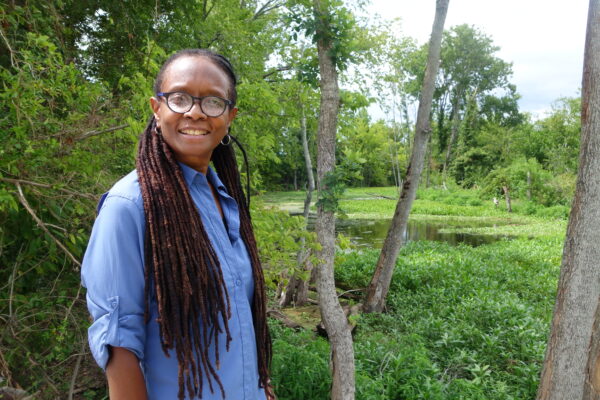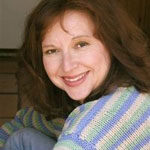This article was originally published on The Christian Science Monitor, with the support of CRCC’s global project on engaged spirituality.
It’s past daybreak on a muggy July morning when Konda Mason reaches the farm, a 5-acre plot in rural Louisiana. Mindful of the heat to come, several workers are already weeding, and Ms. Mason – her daily meditation and yoga done – is ready for a busy day. She’ll field calls from farmers and suppliers, check the progress of the industrial rice mill she’s building, and meet with a journalist curious about why a Black Buddhist from Oakland, California, is growing rice in a red county of a very red state. But right now, in the calm of the still-early hour, Ms. Mason bends to pluck a stray weed or examine a new bud.
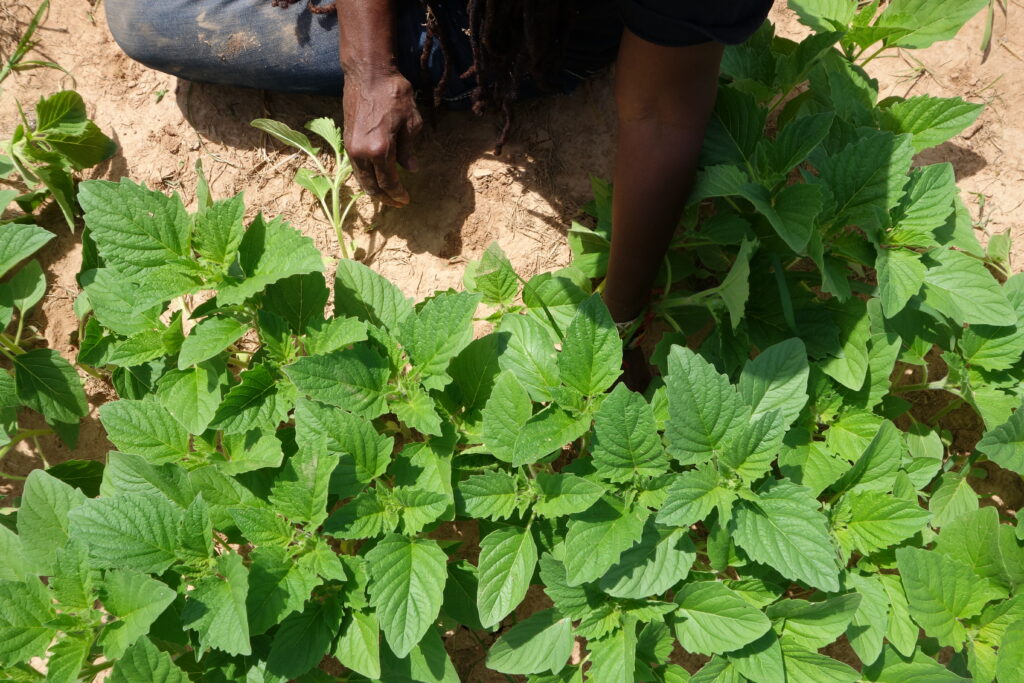
A slender, muscled woman with waist-length dreadlocks, Ms. Mason sees the farm as the apex of her efforts as a social entrepreneur and eco-spiritual activist. Today she’s sporting a red bandanna to shade herself from the sun, but in her nearly 70 years, she has worn many hats. She’s been a concert promoter, filmmaker, and supporter of Black innovators and problem-solvers. As with her other endeavors, this new project manifests the values that have guided her life: love, justice, community, and a willingness to leap into the unknown.
“I was taught by my family that I had a role to play in making this world a better place,” Ms. Mason told listeners in her keynote address at the 2015 Wisdom 2.0 forum in San Francisco. “I’m continually digging into that and figuring out what it means and how it shows up and it changes over time.
“The question I ask myself is, how can you go deeper, what do you have to let go of in order to do that, and are you willing to do it?”
This time, going deeper meant leaving her home, her sister, her partner, and her friends to promote what she hopes is a revolution in rice production. Her goal is to support a more sustainable and less expensive way to grow rice, in hopes of staunching the loss of Black-owned farmland. Working alongside an agronomist from Cornell University, she uses what’s called the System of Rice Intensification, common in developing nations but new to American farmers. Going deeper has also meant mastering the complexities of soil and weed management, crop rotation, fertilization, the milling of rice, and bringing it to market. Equally complex, of course, is working in a region where race relations are historically fraught.
A Black Buddhist
Threading through Ms. Mason’s ventures is her commitment to Buddhism. She began the practice by happenstance, but her bond, deepened over 40 years of study, fuels a fierce desire to leave the world more just and loving than she found it. The majority of American Buddhists are white or Asian; only about 3% of the community is Black. Yet despite their modest numbers, these practitioners have had an outsize impact on American Buddhism, challenging the taken-for-granted individualistic focus, white privilege, and political detachment that have characterized many sanghas (Buddhist communities).
Ms. Mason is a leader in these changes, adopting some practices common to Asian Buddhism and others that reflect her African heritage. Chief among the latter: prioritizing community, honoring ancestors, and embodying spiritual engagement by working for social and political change.
Though deeply committed to Buddhism, Ms. Mason is not an evangelist. At the farm, she rarely discusses her practice, and if she does, she talks about mindfulness, not Buddhism.
“Konda’s had many lives, and I never thought there would be a home for her,” says Dianne Houston, a longtime friend. “But the combination of working on the land with people who share her beliefs about social justice – all the boxes are checked.”
Ms. Mason’s work on the 3,700-acre former plantation is equal parts passion project, spiritual mission, and response to the loss of 12 million acres of Black farmland over the past century. More than 1 million people – or 98% of Black farm owners – have been dispossessed by U.S. Department of Agriculture policies and regional racism. President Joe Biden’s attempt to redress years of unfair policies was contested by white farmers, who complained of racial discrimination. In response, Black farmers launched a class-action suit in hopes of restoring government funding for debt relief.
Since arriving in Louisiana in 2020, Ms. Mason has grown a network of nearly a dozen Black farmers whom her team visits regularly. Her agronomy colleagues offer technical assistance, and she provides rice seed and access to loans. She secured a centrally located, solar-powered industrial mill for processing the plants, and has a distributor to help with marketing. When she’s not working the land or promoting the project, Ms. Mason sometimes dons another hat, leading intentional conversations across racial and economic divides.
Both the farming project and the conversations are part of Jubilee Justice, a nonprofit Ms. Mason created to help change a system that she says has profited by discriminating against people of color and despoiling the planet. It’s the natural outcome of her lifework.
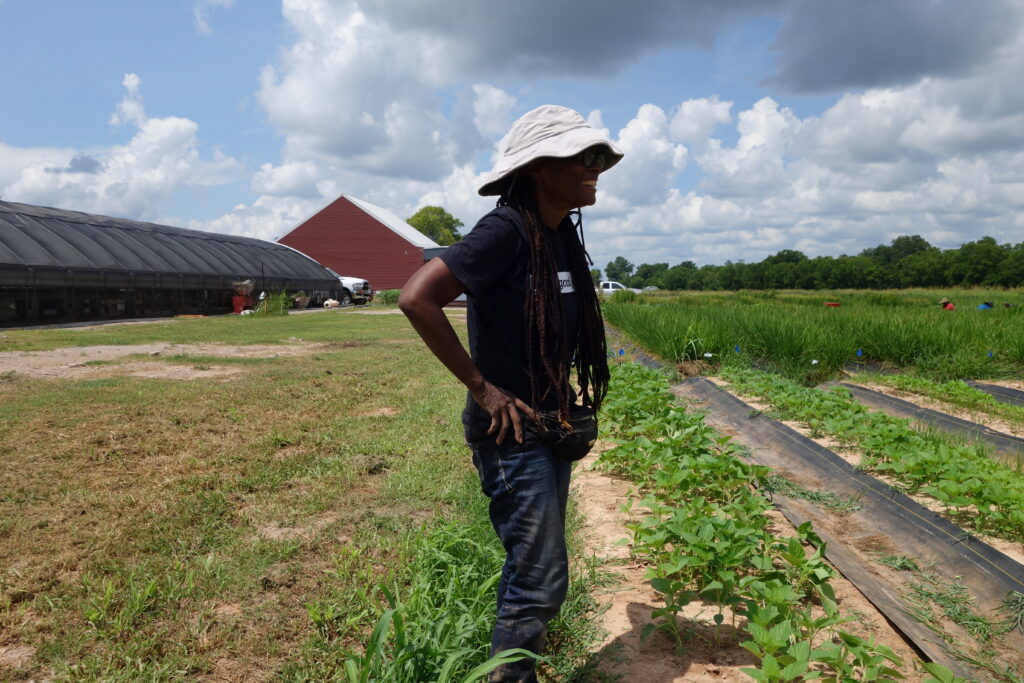
An introduction to racism
Initially, Ms. Mason grew up in San Bernardino, California, in a Black and Mexican neighborhood, where residents were friends. But in February 1968, everything changed. Her family moved to a nearby white suburb, but it may as well have been a foreign country.
“There were probably about four Black families in the whole town,” Ms. Mason recalls. “Suddenly I became aware of racism.”
The family moved so she and her siblings could attend better schools, which, Ms. Mason now says, was the right thing to do. But the relocation coincided with a bleak period in American society, and, at the time, she rued the change.
That spring, Martin Luther King Jr. was assassinated, and two months later presidential candidate Robert F. Kennedy was gunned down. During the Summer Olympics, two Black American medalists raised their fists during the national anthem, a provocative demonstration of Black power and pride.
“So much was happening,” Ms. Mason says. “All the pain of that became dead center of my life.”
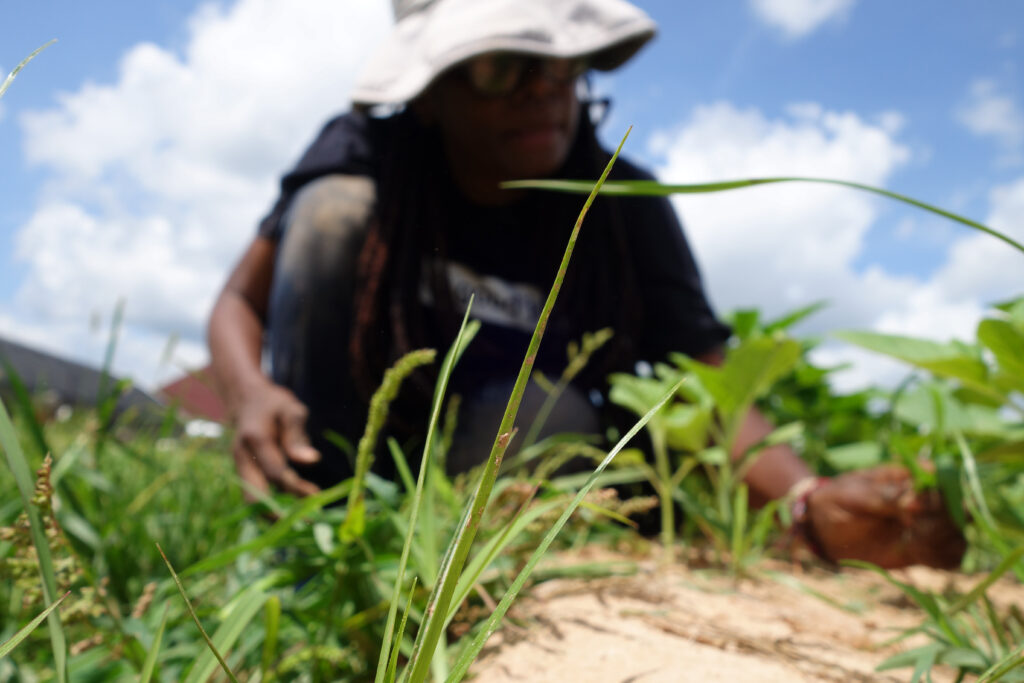
Only in 1973, when she arrived for her first year at the University of California, Berkeley, did things improve. A new friend introduced her to yoga and broadened her taste in music. Soon Ms. Mason was running the Berkeley Jazz Festival, a well-funded community program sponsored by the university. Ultimately, she left school to team up with the manager for Sweet Honey in the Rock, a Black, female a cappella group whose music blended blues, gospel, and jazz. The two joined forces to promote female musicians.
“We would put a Native American group with a Black group or a lesbian group,” she says. “We kept building coalitions. We did it all over the country.”
In her 30s and 40s, while working in music and film, Ms. Mason won a Grammy as a manager for vocalist Caron Wheeler and scored an Oscar nomination for “Tuesday Morning Ride,” a film she worked on with Ms. Houston. But the arts and entertainment path wasn’t enough for her.
Visiting the Bay Area, Ms. Mason decided that the city of Oakland was ripe for change. She moved there and, in 2014, opened the Oakland Impact Hub, a 1,600-square-foot space with room for conferences, exhibitions, concerts, and community events. Her goal was to incubate social entrepreneurs, especially those of color, in an atmosphere where business acumen, social justice concerns, and spiritual practice could inform their work.
Needed: love
Stitching together the various parts of Ms. Mason’s journey are love and community. That was clear when she spoke about her goal for the Impact Hub at the Wisdom 2.0 forum. Stepping away from the podium, she let loose an a cappella version of Tina Turner’s hit “What’s Love Got To Do With It.” At the conclusion of her talk, she repeated the lyric, but this time with an answer: “Love,” she said, “has everything to do with it.”
Ms. Mason’s quest to put love at the center of her work took an unexpected turn several years later. She helped organize a gathering of progressive women; most of the wealth-holders were white, and the activists people of color. Among the attendees was Elizabeth Keller, a white woman and devout Christian. Her grandfather had purchased a former plantation in Louisiana, hoping to “redeem” the land, but he never did. When he died, he left all 3,700 acres to her.
At the gathering, Ms. Keller spoke about the farm and her desire for healing there. She had prayed for someone to show her the way, and, to her surprise, Ms. Mason seemed to be the answer to that prayer.
The plantation could be redeemed, Ms. Mason realized, by using the System of Rice Intensification (SRI) to cultivate a pilot crop and develop a network of Black farmers to adopt the technique.
Ms. Keller, acknowledging that Ms. Mason “saw something I couldn’t,” agreed to let her use the land.
Now Ms. Mason needed expertise. She cold-called Erika Styger, the Cornell agronomist, who knew from working with farmers around the world how SRI increases crop yields, improves the soil, cuts costs, enhances profits, and reduces the environmental impact of rice production. It took some convincing, but in the end, Ms. Mason’s vision and practicality persuaded her to provide technical assistance.
Dr. Styger regularly joins Ms. Mason for farm visits. During a first meeting, they explain what they’re doing and why the farmer may want to try SRI. They suggest cultivating a small plot to see if it works for them.
“We have a very transparent and honest exchange,” Dr. Styger says. “We invite the farmer in as a partner so they feel ownership.”
Donna Isaacs is one of the farmers trying the new growing system.
“Konda called, and we hit [it] off,” says Ms. Isaacs, who co-owns a 14-acre diversified farm in Eros, Louisiana.
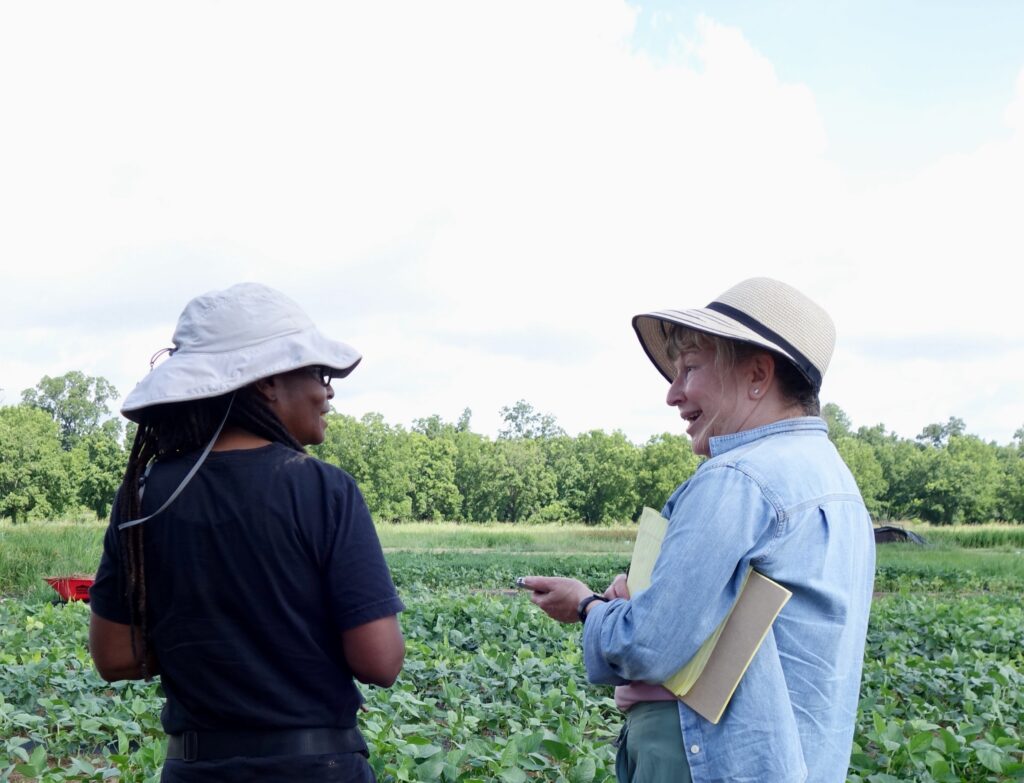
Ms. Isaacs worried that the cost would be prohibitive, but Ms. Mason had an answer for that: Potlikker Capital, “a social justice charitable loan fund supporting farmers of color,” as the website explains.
When Ms. Mason realized that farmers would not have the resources to invest in the necessary equipment, she co-founded Potlikker with Mark Watson, who’d left a lucrative career on Wall Street to focus on socially responsible investing.
Thus far, the fund has deployed $2.5 million. Mr. Watson’s 10-year goal is to secure $50 million to support Black, Indigenous, and Latino farmers nationwide. Potlikker’s first loan went to Ms. Isaacs: $50,000 at 1.5% interest for seven years. Mr. Watson says Potlikker leverages its loans to gain additional support for their partners, as clients are called. Since its inception, the fund has helped almost two dozen farmers with loans running from $50,000 to $250,000.
“Our impact is not just the number of loans we make, but also building community resiliency,” Mr. Watson says. “It’s all about connections.”
Mr. Watson and Ms. Mason agree that connections are crucial for social change. They don’t want to Band-Aid social ills but to reform unjust systems through personal transformation.
“How do we as individuals change our hearts and minds so that we are no longer complicit in a system?” asks Ms. Mason, explaining the goal of the Jubilee Justice journeys she started. “And then how do we become active members of creating another system?”
The journeys began with the gathering where Ms. Mason and Ms. Keller first talked about rice farming. But after a few successful conversation circles among racially and economically diverse groups, Ms. Mason realized the gatherings needed to go deeper.
“We as Americans are reluctant to go backwards before we go forwards, to go back and understand what happened and heal,” she explains. “But if we don’t do that, we don’t have a chance. We can’t build on a faulty foundation.
“Race is key, because it is the faultiest part of our system.”
Ms. Mason decided the next journey would be a two-year commitment and that the participants, whom she selected, would dig into their genealogies.
“Our Ancestral Journey” started in September 2021 with a socioeconomically diverse group of 25 white people and 25 people of color. They met yearly at the farm and every three weeks on Zoom. Sometimes they had speakers talking about race, but most of their time was spent discussing their genealogical research.
“This is quite an experiment because this is white folks looking at their genealogies as slaveholders and Black folks looking at their genealogies as formerly enslaved,” says Ms. Mason, who ran the group along with a storyteller. Hearing about each other’s background “has been painful,” Ms. Mason says, quickly adding that there was also a lot of love.
Adriane Rozier, who met Ms. Mason at a retreat for Buddhists of color, joined the group to learn more about her family tree. The genealogical discoveries were exciting, but she found so much more.
“Descendants of slaves and descendants of enslavers came into healing together to repair relationships and build partnerships,” she says. “I felt I knew these people, and I almost didn’t want to leave.”
Although the two-year genealogical conversations ended a few months ago, Ms. Rozier says some participants plan to continue their journey together.
For her part, Ms. Mason was exhausted and exhilarated after the final gathering. But she was also that much closer to the vision she had articulated years earlier in San Francisco. “What’s love got to do with it?” she’d asked. The answer? “Love has everything to do with it.”
Click here to read the article on The Christian Science Monitor
Diane Winston is a university fellow with the USC Center for Religion and Civic Culture.
